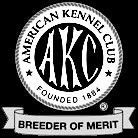|
|
|
Julie
Borst Reed |
|
u |
| u |
| Breeder
Ethics Questionnaire |
| u |
| Puppy Comes Home |
| u |
| u |
| Puppy Temperament Testing |
| u |
| Recommended Diet |
| u |
| FAQs
About Feeding Raw |
| u |
| REAL Dog Food |
| u |
| Fleas 101 |
| u |
| Standard
Poodle Health Concerns |
| u |
| Recommended Vaccination Schedule |
| u |
| Vaccination Decisions |
| u |
| Neutering |
| u |
| Photo Gallery |
| u |
| A Breeder's Life |
| u |
|
Interview
with Dog Breeders' Guild |
| u |
| Poodle Funnies |
| u |
| Tiara Home |
| u |
| u |

|
|
|
Julie
Borst, Breeder of the Tiara Standard Poodles
Part 2 of "An Interview With the Dog Breeders' Guild"
| <<Incredibly, all
19 pups together! Click on the image to see a larger version. |
I
will start by writing a big thank you to like-minded Breeder, Arlene Mills
for discussing her over-sized, apricot miniature bred to small blue
standard breedings with me. My new litters (Tiara D and Tiara E) are
a bit different being all black and the bitches I used are 22 and 23 1/2
inches tall and the sire 15 inches tall. This size difference was
the only real concern most of us had going into the breedings here.
Also, a huge thank you to Pirkko Ranta-aho, for sharing her experiences
with her beautiful dogs. I wanted these other ladies to discuss their own
experiences with their intervariety breedings publicly and I am glad they
wrote about their poodles recently, during a time when my discussions of
the mini/standard breedings were under much scrutiny and debate as
suspicious and unusual by other poodle fanciers, most of whom were not
very interested in lowering the COI in standard poodles. My
boyfriend, Kirk Reed, met with Pirkko and her lovely poodles in person at
her place in the city of Helsinki two years ago. His report of her
dog, Paavo, the result of intervariety breeding, as being a handsome
poodle and a gentleman at that, helped me finalize my plans to go ahead
with the combination mating in November 2001.
"Miniature poodles should have ophthalmologist exam for PPMs* at 6
weeks to 8 weeks of age, before leaving for new homes." I was
told this by a miniature poodle breeder when inquiring to my poodle club
membership as to what testing I should accomplish differently then I do
with the standard/standard pairings. I had the findings registered
as I do all my eye examinations on my poodles (all 19 puppies of the D
& E litters showed no problems with their eyes). Every poodle in
my care is tested and registered yearly with CERF. New owners will be
encouraged to do the same. Optigen runs a DNA test for the
most common PRA in poodles. The test does not have to be run for the
D & E puppies here, nor would I think it be permitted as these are
(small) standard poodles. The test is for miniature and toy poodles
only at this time. The sire is Optigen A rated (genetically clear of
the prcd form of PRA). He is a carrier for vWD according to VetGen
and the dam and all her VetGen vWD tested relatives are clear (@ 30 tested
to date). Of the 8 puppies I selected to run the VetGen vWD DNA
test, ALL have tested clear.
Note: it was known that none of the puppies of this litter would be
affected, as the dam is DNA clear. The genetic testing is registered with
the OFA. The D & E puppies testing clear is a blessing. I
truly wanted only the clears to be considered for the next generation.
With all 8 puppies submitted testing clear, this gives us a lot more from
which to select. Using the Volhard Personality Profiling aids in
selection at this time as well. Details of the profiling may be seen at:
http://www.tiarapoodles.com/temperament.html
The profiling has also been an article subject in the AKC Gazette magazine
issues: March 1979, March 1985 and February 1987.
The D & E litter puppies had complete physical examinations and health
certificates issued including patella palpation. The D and E litter
were deemed totally healthy and clear of patella luxation at this time,
and the E litter proved to be just a bit tighter in that joint, if the
veterinarian had to choose. The E litter also proved more evenly sized as
well as testing just a squeak better on the Personality Profiles, not one
puppy had their mouth on the tester, the D litter had a few more pushy
individuals, although still testing very high for performance with
excellent work ethic traits. One of the D litter males looks forward
to a retriever trialing career.
The 10 puppies average weight of the E litter at 58 days of age was 5 3/4
pounds. One pup at 5 lbs and one pup at 6.5 lbs and the rest very
evenly sized at 5.5 and 6 lbs. The 9 pups of the D litter showed
more variance with a 4.9 lb and a 6.9 lb puppy and variations in between
with an average of 6 lbs at the same age. This is about 1 1/2 lbs behind
the average weights of my standard/standard litters (weighed on the same
digital scale at the same approximate day of age). These puppies are
lighter-framed than my recent (3) litters with the Latvian sire (two in
summer of 2000 and one in summer of 2002; the last least related standard
male I could locate). Goal is to find more miniatures with the test
clearance criteria already in place and to incorporate and to utilize the
Latvian influence as well.
All my dogs are fed an entirely raw food diet and those puppies staying
with me will be vaccinated for rabies only. Vaccines are sent home
with puppies: a distemper/measles for 12+ weeks and a killed Parvo for 16+
weeks of age; this schedule is from my homeopathic veterinarian for people
that must vaccinate their pets. No heartworm or flea preventative
will be/has been used ever here. Nothing posted as to this is how
everyone has to do things. It is posted to share with those interested,
how these puppies are raised and the results.
The bodies of the D and E litters here are very well-proportioned and the
eye and shoulders are noticeably improved over the dams. I was
getting a larger eye opening in my current breeding generation than I
think ideal. These mini/standard litters have gorgeous eyes. The
dams have very nice shoulder angulation, but the improvement is noted, as
is tail-set a bit more ideal. Tail carriage seems a bit loose
compared to my standard/standard litters and this was really noted
starting at about 6 and 7 weeks in the litters. Coats are superb and
should stay very black from indications compared to other standard poodle
litters I have raised (since 1976). The low inbreeding litters are
noticeably calmer (Latvian and mini sired litters), than even litters at 9
and 11% COI (100/9 and 100/10). The mini/standard pups have
individuals that do indeed have drive above and beyond what has been seen
in the standard/standard litters here.
Both sire and dams have performance (as well as champion) titled relatives
laterally in their pedigrees. The dams are notably athletic and very
fit. One has won agility titles, the other, a half sister (shared sire),
has proven that no pen without a top, no matter how high, is an obstacle.
To tell on her: she used to open all the kennel doors and let her friends
out where she lived with a co-owner from the time she was a teenager to 3
years of age. Talent? Well, definitely a thinking poodle.
Hope this helps give a more detailed presentation of my current goals and
how they are progressing. My deepest thanks to Arlene Mills of
Crabapple Downs and Pirkko Ranta-aho of Sir Ascot Poodles, for writing
about their mini/standard litters and for also sharing a little about our
common mentor and supporter, Dr John Armstrong to an e-mail list of
(mixed-level) poodle fanciers. The variety is in real need of new
genetic material. More can be studied about the effects of the
Popular Sire Syndrome, which has wreaked havoc to the standard poodle gene
pool selection at:
http://www.magmacom.com/~kaitlin/diversity/genetics.html
Julie Borst
Tiara Black Standard Poodles
La Jolla, CA
www.tiarapoodles.com
*"Persistent pupillary membranes, PPMs as they are often called are
common findings on CERF examinations." to read more about this
condition, see these fine sites presented by Breeders:
http://www.dogstop.com/povrlrd/clickher.htm
http://www.basenji.org/african/brown794.htm
http://www.labbies.com/eye.htm
Home
| About
| Puppy Comes Home
| Equipment
Recommended Diet |
FAQs About Feeding Raw
Recommended Vacc. Schedule |
Vaccination Decisions
Breeder Ethics Questionnaire |
Photo Gallery
Recent
Litters | A
Breeder's Life
| The Dapper Dog by TIARA
|
|
||
|
|
|
|
|
Site
designed by POL |
||



